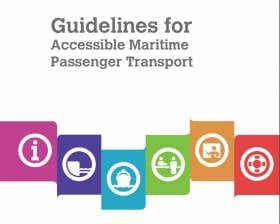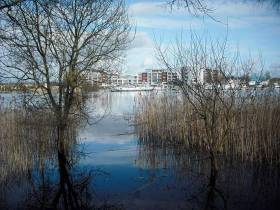Displaying items by tag: Accessibility
Inland Fisheries Ireland (IFI) has launched an ‘all abilities’ accessible angling facility in West Cork to enable wheelchair users to fish safely and conveniently.
The bespoke €106,000 fishing platform at Shepperton Lake, 3km from Skibbereen, provides access to wheelchair users and those with reduced mobility to a section of the popular angling destination.
Up to four wheelchair anglers at a time can be accommodated at the outdoor facility which consists of a long boardwalk and a large accessible steel stand, a new picnic area and parking for six vehicles.
The initiative was co-funded by IFI and the Department of Rural and Community Development.
Speaking at the opening of the new platform, John Twomey, disheries inspector with IFI said: “The demand for accessible and safe infrastructure for wheelchair users — and those with reduced mobility — at Shepperton Lake was obvious, and we are looking forward to seeing many anglers enjoy our brand new facility.
 Deirdre Harrington with John Twomey of IFI on the new accessible angling platform
Deirdre Harrington with John Twomey of IFI on the new accessible angling platform
“We’re delighted to have had the opportunity to work with the Irish Wheelchair Association on this project and are very pleased the amenity has been constructed. We can’t wait for the new stand to open tomorrow, and for it to be used by people of all abilities.”
On Friday (31 March) IFI hosted members of the Irish Wheelchair Association in Clonakilty, Co Cork for the official opening of the new amenity, following an extensive programme of works to transform the site to support inclusive angling.
Sinéad Burke, service support officer for the Irish Wheelchair Association said: “Our service users are thrilled with the new fishing podium at Shepperton Lake and will be able to enjoy a long season of fishing from now on.
“Getting out in nature and having access to a tailor-made resource like this will be extremely beneficial to the wellbeing of our service users. We would like to thank the incredible team of IFI who went above and beyond to enhance the fishing experience of our service users. We feel very grateful to work in partnership with the team from IFI.”
IFI has collaborated with the Irish Wheelchair Association in Clonakilty for the past seven years and in that period angling day trips to Shepperton Lake have increased in popularity among the latter’s members, the organisations say.
Public Meeting This Week to Highlight Accessibility Issues at Dun Laoghaire Baths
A public meeting to demand a public pool and improved accessibility at the newly reopened Dun Laoghaire Baths will take place this Thursday 23 February from 7pm at the National Maritime Museum.
It follows complaints highlighted last month over access issues at the multi-million-euro amenity, which opened in December after years of stop-start redevelopment works.
Access to the amphitheatre level of the baths is currently only by steps or by temporary ramps, which have been described as “wall-like” by advocacy group Access for All.
Dun Laoghaire-Rathdown County Council has promised upgrades to accessibility in the second phase of development, but there is as yet no confirmed timeframe for these works.
There is also no ETA for the inclusion of a public seawater pool at the site, with the local authority suggesting it could be part of “a future phase of development”.
Wheelchair users have highlighted accessibility issues at the newly reopened Dun Laoghaire Baths — with the current temporary ramps deemed as too steep.
As The Journal reports, one accessibility advocate described the ramps to the lower-level amphitheatre as “disgraceful”.
“They knew very well that they were building these, as I like to call them, wall-like ramps, because you may as well build walls, they are so steep,” Sean O’Kelly of Access for All said.
The past few weeks we’ve been inundated with messages about the new baths out in #DunLaoghaire and the fact the ramps out there are mountainous.
— Access For All Ireland (@AccessForAll7) January 3, 2023
Sean is a local so we made a couple of videos yesterday, now tell us this public place is inclusive and accessible, go on tell us.? pic.twitter.com/M8eJyiB9Gg
A spokesperson for Dun Laoghaire-Rathdown County Council acknowledged that the site “isn’t currently as accessible for all as we would like it to be” and promised that upgrades would come in the second phase.
However, the tendering process for this phase has yet to be opened. The local authority says it expects to have contractors on site later this year — a situation Access For All decries as “not good enough”.
The Journal has more on the story HERE.
New Guidelines For Accessible Maritime Passenger Transport
The Department of Transport, Tourism and Sport (DTTAS) recently published new accessibility guidelines designed as a support to all those involved in providing maritime passenger transport services.
This includes passenger vessel owners and operators, port operators and local authorities, as well as Government departments with a statutory remit in relation to maritime passenger transport services.
The advice given covers all aspects of a journey, including:
- Advice on providing accessible information for planning the journey
- Improving access on board vessels
- Making shore-side facilities accessible
- Disability awareness training for staff
- Improving communications with passengers
The full guidelines are available from the Government website as a PDF to read or download HERE.
Minister Unveils New Angling Infrastructure In Galway & Athlone
#Angling - Minister for Communications, Climate Action and Environment, Denis Naughten has officially launched new angling developments at the Golden Mile in Athlone, Co Westmeath and at Lough Acalla in Co Galway.
These works were completed under the National Strategy for Angling Development (NSAD) and greatly enhance the angling infrastructure in both counties, according to Inland Fisheries Ireland (IFI).
The wheelchair-accessible angling structures at Lough Acalla comprise floating fishing stands and a connecting bridge to provide for all-year-round fishing.
Total investment in Athlone amounted to €73,000 to build up access causeways, remove old wooden structures and design, manufacture and fit the three floating angling stands.
IFI worked with the local angling clubs, the relevant statutory agencies and contractors in the design and construction of these new floating platforms.
The works form part of a wider development at the Burgess Park and Meadows area, involving Athlone Municipal District, Waterways Ireland, National Parks and Wildlife Service, ESB Fisheries and Athlone Midlands and District Anglers.
At the Lough Acalla development, two large old wooden angling stands were removed and replaced with a fixed concrete catwalk and floating galvanised angling stand.
A new path was also constructed from a set down area in the existing carpark, providing wheelchair accessibility to the entire structure.
IFI worked with anglers and landowners throughout the project to deliver this key piece of infrastructure at this important trout fishery.
Together with other development works at Emlaghroyan, the total development in this River Suck project was €87,000.
Speaking in Athlone after the ribbon-cutting ceremony, Minister Naughten said: “These much needed new developments will add considerably to the angling infrastructure in the upper and mid-Shannon regions, ensuring accessibility for all anglers.
“This investment will play a key role in boosting tourism to the Lakelands region and ensure our valuable natural resources are protected.”
Marine Notices on Vessel Maintenance and Accessibility
#MarineNotice - A recent Marine Notice from the Department of Transport, Tourism and Sport (DTTAS) raises importance of maintenance as highlighted in the MCIB report into the scuttling of fishing vessel Jeanette Roberta in Glandore Harbour in late 2011.
As previously reported on Afloat.ie, the prawn boat was returning to port on 11 December 2011 when the skipper had difficulty switching the helm from auto-pilot to manual due to a known issue with "sticky solenoids". The boat subsequently veered off course without warning and was holed on rocks on Adam's Island.
The official report into the incident castigated the owner/skipper for continuing to sail the vessel with persistent navigation issues - and Marine Notice No 04 of 2013 reminds all fishing vessel operators to ensure that deficiencies with their vessels are rectified without delay.
It is the responsibility of the owner to ensure that a vessel is maintained and operated at all times in accordance with the requirements of the agreed Code of Practice. Owners of all vessels also have a legal obligation to operate their vessels in accordance with the law.
Meanwhile, the latest Marine Notice is directed at passenger vessel owners and operators - encouraging them to continue voluntary efforts to improve accessibility on their vessels.
A new questionnaire has been made available to inform the DTTAS about the extent of accessibility improvements introduced to maritime passenger transport services in the State.
Full details are included in Marine Notice No 05 of 2013, a PDF of which is available to read or download HERE.


























































